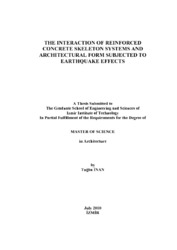Please use this identifier to cite or link to this item:
https://hdl.handle.net/11147/3820Full metadata record
| DC Field | Value | Language |
|---|---|---|
| dc.contributor.advisor | Korkmaz, Koray | - |
| dc.contributor.author | İnan, Tuğba | - |
| dc.date.accessioned | 2014-07-22T13:52:26Z | - |
| dc.date.available | 2014-07-22T13:52:26Z | - |
| dc.date.issued | 2010 | - |
| dc.identifier.uri | http://hdl.handle.net/11147/3820 | - |
| dc.description | Thesis (Master)--İzmir Institute of Technology, Architecture, İzmir, 2010 | en_US |
| dc.description | Includes bibliographical references (leaves: 167-173) | en_US |
| dc.description | Text in English; Abstract: Turkish and English | en_US |
| dc.description | xvi, 173 leaves | en_US |
| dc.description.abstract | 3 The interaction of architectural form and structural configuration has become a serious issue in the building industry because of the poor seismic performance of reinforced concrete buildings in Turkey. Therefore, it has a determinative role on earthquake behaviour of buildings. The study focuses on R/C skeleton systems which are commonly constructed in building industry of Turkey. In this study, structural irregularities in plan and vertical direction have been investigated in detail based on Turkish Earthquake Code, 2007. Four main cases are generated based on each structural irregularity in plan. These cases consist of 29 main parametric models and totally 265 models with sub models. They are designed as to have symmetrical or asymmetrical plan geometry and regular or irregular rigidity distribution. All models are analyzed by using the structural analyzing software, IdeCAD Static 6.0055. The changes in the earthquake behaviour of buildings were examined according to the number of stories, number of axes, configuration of structural elements, floor openings, projections in plan and vertical direction. Many findings are obtained and assessed as a result of the analysis for each structural irregularity. The most remarkable result shows that structural irregularities can be observed in completely symmetric buildings in terms of plan geometry and rigidity distribution due to the inaccurate structural system selection. Moreover, it has emerged that symmetry in the rigidity distribution is more important than the symmetry in the plan geometry. | en_US |
| dc.language.iso | en | en_US |
| dc.publisher | Izmir Institute of Technology | en_US |
| dc.rights | info:eu-repo/semantics/openAccess | en_US |
| dc.subject.lcsh | Buildings--Earthquake effects | en |
| dc.subject.lcsh | Reinforced concrete construction | en |
| dc.title | The Interaction of Reinforced Concrete Skeleton Systems Andarchitectural Form Subjected To Earthquake Effects | en_US |
| dc.type | Master Thesis | en_US |
| dc.institutionauthor | İnan, Tuğba | - |
| dc.department | Thesis (Master)--İzmir Institute of Technology, Architecture | en_US |
| dc.relation.publicationcategory | Tez | en_US |
| dc.identifier.wosquality | N/A | - |
| dc.identifier.scopusquality | N/A | - |
| item.openairecristype | http://purl.org/coar/resource_type/c_18cf | - |
| item.languageiso639-1 | en | - |
| item.openairetype | Master Thesis | - |
| item.grantfulltext | open | - |
| item.fulltext | With Fulltext | - |
| item.cerifentitytype | Publications | - |
| Appears in Collections: | Master Degree / Yüksek Lisans Tezleri | |
Files in This Item:
| File | Description | Size | Format | |
|---|---|---|---|---|
| T000854.pdf | MasterThesis | 3.8 MB | Adobe PDF |  View/Open |
CORE Recommender
Sorry the service is unavailable at the moment. Please try again later.
Items in GCRIS Repository are protected by copyright, with all rights reserved, unless otherwise indicated.